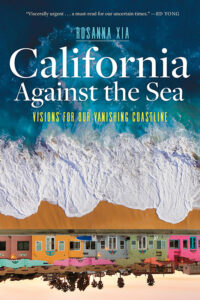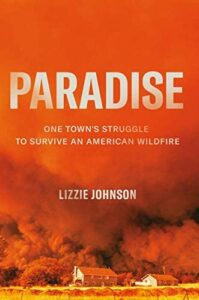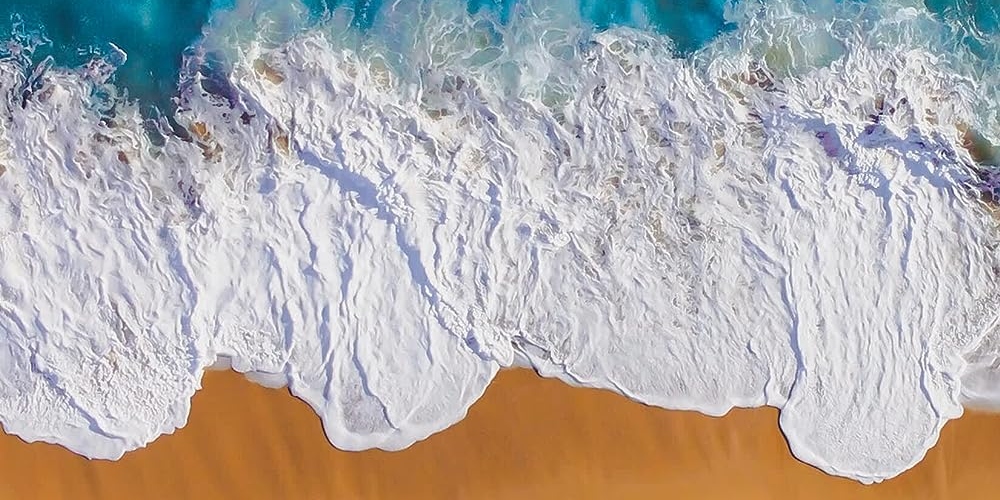Deep into my writing spiral in the fall of 2021, just when I was about to give up on turning my reporting at the Los Angeles Times into a book-length opus on sea level rise, Lizzie Johnson, now a reporter at the Washington Post, published a stunning, heartfelt account of one of the nation’s deadliest wildfires. Paradise: One Town’s Struggle to Survive an American Wildfire felt like a sign from the climate-writing gods.
I read Paradise in almost one sitting, gripped by Lizzie’s storytelling and inspired by what our books had in common. We both spent years getting to know a rapidly changing landscape and the people who called it home. We both examined what’s happening in California as a glimpse into the future. In the face of rising seas and runaway wildfires, we both had to reckon with the world that we’re living in—and what we stand to lose. When I finally submitted my manuscript, many months later, I was relieved to hear my editor describe it as a remarkable blend of old-school journalism, radical listening, and deep hanging out. I have Paradise to thank for showing how this can be done.
Now on the eve of bringing my book, California Against the Sea: Visions for Our Vanishing Coastline, officially into the world, it felt only right to give Lizzie a call. As we reflected on the growing pains of moving beyond the traditional bounds of newspaper writing, the kinship between our two books became even more clear. Here is a snapshot of our conversation, lightly edited for length and clarity.
*
Rosanna Xia: We both chose to write our books in third person, and I suspect that’s rooted in our journalism backgrounds. But in reading Paradise, I felt such a deep empathy in your writing, and also love. Love for the town and immense care for every person that you met. How do you reach that level of compassion in your writing?
Lizzie Johnson: To write powerfully about a place, I feel like you have to come to know it and love it and almost become part of it. Some months I was in Paradise more often than I was at home in San Francisco. It allowed me to understand why people wanted to live there and why returning mattered to them—even if maybe that wasn’t the best idea. I saw the daffodils blooming in the ash and the pine trees growing back green. There was this one house where a baby ponderosa pine had been planted inside the burnt husk of the old pine that had been there. It was literally new life growing up amid the destruction.
All of that love, grief, despair, and utter confusion over what to do next—everything that I was seeing and experiencing—I wanted readers to feel. This definitely came across in your book, too. I felt you all over your book, Rosanna, because I was feeling what I imagined you were feeling as you were seeing these places and getting to know each person. It was so vivid, and I was like, “Wow, she really loves this place. She really cares about the shoreline and what will happen next.”
“To write powerfully about a place, I feel like you have to come to know it and love it and almost become part of it.”
RX: This is making me remember that I even got emotional learning about all the bugs that used to live on the beach—bugs that disappeared because the plants disappeared, and because the plants and bugs disappeared, so many shorebirds also disappeared. I even teared up about mud, when I realized just how much goes into reviving a wetland. You’re right—in order to make someone care, you have to experience everything yourself in such an intense and all-encompassing way.
LJ: There’s also this shift, I think, from telling the story of the present to writing the story of the future—of what it looks like for a place like Paradise and what it means for other places that will confront a fate like Paradise, which we just saw in Lahaina.
RX: Truly, and I was so struck by how you structured your book. I’ve been wanting to ask: was this the structure you started with, or did it come out of the rewriting process? (I might be projecting my own experience because I definitely had an existential crisis with structure!)
LJ: Oh structure, the bane of my existence. Even just writing a newspaper story—trying to figure out how to structure it—can be overwhelming for me, let alone an entire book. The way I’ve learned how to cope is by doing it in little chunks. So when I’m writing for the newspaper, I will write one section of the story and hand it to my editor, and then I’ll move on to the next section once I know I’m headed in the right direction. That’s how my book editor and I approached it as well: I would write one section, and we would edit it, get it totally polished, and then set it aside.
I wish I could take credit for how my book is centered around the different phases of a wildfire, but it was actually my brilliant editor who was like, “You know what, there’s a strong parallel between what happened before the fire, with kindling, and during the fire, with the spark, and then containment, and the ash.” The second she said that, it really resonated. So from there, we broke down each section into chapters and figured out how to weave all of these narratives together from the vantage points of the many people who interacted with the fire.
“How do you, after all, end a book about an issue that we’re still desperately trying to figure out?”
I noticed that in both of our books, the inclusion of an Indigenous tale was an important piece of the structure. I was so thrilled to read that in your book, and I’m curious how you found it, and why you thought it was important to include?
RX: I was reflecting on the Rainbow Bridge story with a biologist who’s also a member of the Coastal Band of the Chumash Nation, and she noted that these stories are not just stories—they’re also oral records. And in this case, the Rainbow Bridge story might actually be the first record of sea level rise along what we know today as the California coast. I’ve been thinking a lot about what it means to truly value Indigenous knowledge in a way that is equal to a peer-reviewed science paper or something published by a historian with a PhD, and I was just so struck by her interpretation of the Rainbow Bridge story that I knew in that moment, from that conversation, that this would be how the book begins.
And while it took me many, many more years to find the ending—how do you, after all, end a book about an issue that we’re still desperately trying to figure out?—everything clicked for me when I got to know the story of the Kashia people. And so the arc of this book, this story about our coast, ends up giving the first word to the Chumash and the final word to the Kashia. These stories, their wisdom, have existed along our coast this whole time, if only more people were willing to listen.
LJ: Similar to what you were saying, as a journalist, I’m always thinking about the stories that I choose to tell and who I choose to represent in a story. Because when you write about someone, you give them power. When you quote someone, you give them power. I was thinking about that when I stumbled upon the Konkow legend—quite literally, I was on a tour of the burn zone, and there were a few members of the tribe there who told us this legend as we were standing on a ledge overlooking an area that had been totally ravaged. I remember getting goosebumps all over my body and thinking, “This has to be the spine of the book.” This is knowledge that has been around for so long—but has been erased from the land—and I wanted to give back that power.
Touching back to something you said earlier about first versus third person: I still felt you there as I was reading your descriptions of the ocean—and of different people interacting with the ocean, explaining their history with the shore—and I thought a lot about how your relationship with the ocean must have changed over time. What was that like for you?
“I’m constantly wrestling with how I want the reader to feel at the end of any story about climate change.”
RX: My dear, brilliant editor, during one of my more painful rewrites, pushed me to bring the ocean more to life—to truly see the ocean, and to be seen by the ocean, and to give this massive body of water a voice. I had been so focused on giving voice to each person I met, that the ocean itself was feeling absent in my writing.
Well turns out, I was already forming, somewhat subconsciously, a deeper relationship with the ocean. Something that I’ve done for years, every time I’m out by the water, is to note what hue of blue it is that day, or how the light is peeking through the marine layer, or what the waves sound like as they break over cobble versus softer sand. I’d always jot down a few details that surprised me or kept me mesmerized once I finally quieted my mind. I usually did this for myself, at the end of an interview, after I’d said my goodbyes. Just hit pause for a moment and allow everything along this coastline to present itself to me—details that I hadn’t noticed when I was in reporting mode.
I had brushed past these “non-reporting” notes when writing my first draft, and by having my editor push me to reorient the way I regarded the ocean—that actually helped me see this quiet throughline that had existed the entire time.
LJ: It’s so funny you say that, because my editor also told me, “You need to write about the fire as if it’s a character in the book”—to describe the fire and what it feels like—almost making it this thing that is separate from the town, this thing that exists on the landscape and deserves to be there. Because that is its rightful place, regardless of the decisions we have made about how we think it should be managed.
RX: Our books really are siblings, and gosh, Lizzie, your descriptions of fire really gripped me. I relished so many of your turns of phrase, and your choice of verbs, in particular, were so good.
LJ: This sounds silly, but when I was trying to figure out how to write about the fire, I would do things like light candles and watch how the flame moved or go have a bonfire at Ocean Beach in San Francisco and listen to its crackle and roar. This helped me see and write about fire as its own separate entity, apart from what I had seen—and was still seeing—in burn zones across California, where the flames were far scarier. Fire is so mesmerizing, and it’s also destructive.
Rosanna, you spent so long studying the ocean and the land, and the marriage between them, and creating this beautiful book for all of us. What is it that you want people to walk away remembering?
RX: I’m constantly wrestling with how I want the reader to feel at the end of any story about climate change. The more I’ve tried to balance the “right” amount of hope versus despair, or an urgent sense of loss, I’ve come to realize that it’s not the feeling of hope that I should be indexing on. It’s responsibility. We have a responsibility to take better care of the air we breathe, the forests we rely on, and, of course, the ocean, this massive body of water that has quietly absorbed the brunt of our emissions. We have a duty to clean up these messes of our past, and to reconsider how we want to live in the future. And embracing this responsibility takes courage.
I feel like courage, and not being afraid of change—and being brave enough to question whether we need to change—is at the heart of both our books. Can we reimagine and rebuild in a way that is in better relationship with our natural world?
LJ: Yes, you have to look to the past to look to the future, right? Both of these books show what we could lose. And both also show that it doesn’t have to be that way going forward.
__________________________

Rosanna Xia’s California Against the Sea is available now from Heyday Books.

Lizzie Johnson’s Paradise is available now from Crown.
